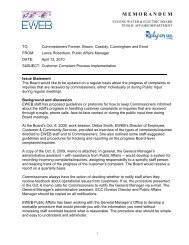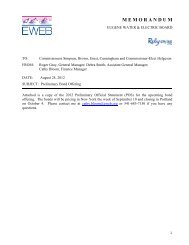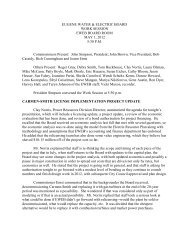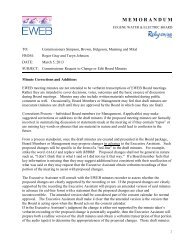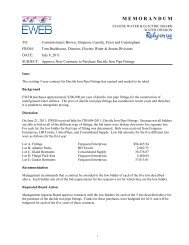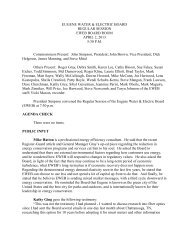Work Session Minutes - Eugene Water & Electric Board
Work Session Minutes - Eugene Water & Electric Board
Work Session Minutes - Eugene Water & Electric Board
Create successful ePaper yourself
Turn your PDF publications into a flip-book with our unique Google optimized e-Paper software.
EUGENE WATER & ELECTRIC BOARD<br />
WORK SESSION<br />
EWEB BOARD ROOM<br />
OCTOBER 2, 2012<br />
5:30 P.M.<br />
Commissioners Present: John Simpson, President; John Brown, Vice President; Joann<br />
Ernst, Rich Cunningham, and Dick Helgeson<br />
Others Present: Roger Gray, Debra Smith, Roger Kline, Todd Simmons, Lisa Atkin, Erin<br />
Erben, Dave Churchman, Frank Lawson, Colleen Wedin, Lisa Adkin, Mark Freeman, Mel<br />
Damewood, Jason Heuser, Sheila Crawford, Steve Newcomb, Megan Capper, Lance Robertson,<br />
Sibyl Geiselman, Anne Kah, Cathy Bloom, Kathy Grey, Sue Fahey, Mike Logan, Steve Mangan,<br />
Anna Wade, Sue Palmer-Boyd, and Taryn Johnson of the EWEB staff; Vicki Maxon, recorder.<br />
President Simpson convened the Regular <strong>Session</strong> of the <strong>Eugene</strong> <strong>Water</strong> & <strong>Electric</strong> <strong>Board</strong><br />
(EWEB) at 5:30 p.m.<br />
AGENDA CHECK<br />
President Simpson briefly reviewed the agenda for tonight’s meeting.<br />
REGIONAL POWER AND TRANSMISSION POLICY UPDATE<br />
With the use of overheads, Erin Erben, Power Resources & Strategic Planning Manager,<br />
and Dave Churchman, Power Operations Manager, reviewed regional activities, regional policies<br />
and power markets, and various regional governmental activities that EWEB is involved in.<br />
Vice President Brown asked why EWEB’s audit didn’t expose a recent major metering<br />
error and wondered why the auditors don’t have a checks and balance system that would have<br />
caused them to notice it. Mr. Churchman replied that this happened just a couple of months ago,<br />
and staff had been previously notified of the mistake and had been discussing it with BPA<br />
previous to the audit. General Manager Gray added that this issue was an operational vs.<br />
financial obstacle and that he isn’t sure if an audit would find a metering mistake, but he will<br />
follow up on that with Cathy Bloom, Financial Services Manager, in order to get more<br />
information.<br />
Mr. Churchman noted that the faulty meter reading was caused by a problem with the<br />
meter itself, and that it was indeed registering, but not correctly.<br />
With the aid of overheads, Mr. Churchman then reviewed regional power market activity<br />
and noted the current volatility of market pricing and generation fluctuations.<br />
In response to a question from Commissioner Cunningham, General Manager Gray<br />
briefly explained how wind, biomass, hydroelectric market, and power loads are forecast and<br />
how they can fluctuate.
<strong>Work</strong> <strong>Session</strong><br />
October 2, 2012<br />
Page 2 of 8<br />
Vice President Brown asked if the <strong>Board</strong> can be confident about these forecasts. General<br />
Manager Gray replied that that is a very important question and that there are some assumptions<br />
that need to be challenged. Ms. Erben added that the <strong>Board</strong> should continue to ask these difficult<br />
questions so that staff can make the best choices. A brief discussion ensued regarding<br />
hydroelectric load forecasts, the liquidity of the power market, etc.<br />
Jason Heuser, Legislative Representative, gave the <strong>Board</strong> a governmental affairs update.<br />
With the use of overheads, he reviewed EWEB’s Energy Supplier Assessment (ESA) payments<br />
from 2006-2012.<br />
Vice President Brown asked how long it will take to reverse and reduce these payments<br />
and to fight this issue. Mr. Heuser replied that investor-owned utilities (IOUs), gas distributors<br />
and wind farm personnel have formed a coalition to fight this issue (with a “full court press”),<br />
and that EWEB has allies in several key legislators, i.e., Senator Betsy Johnson of Scappoose,<br />
and Chris Edwards locally. He said the main issue is the necessity for the Oregon Department of<br />
Energy (ODOE) to do full transparency.<br />
With the use of overheads, Mr. Heuser then reviewed BPA’s hydro efficiency renewable<br />
energy credits (RECS) and how EWEB will endeavor to influence the completion of ODOE’s<br />
rulemaking process to address these RECS due to the fact that ODOE is in “analysis paralysis.”<br />
He added that EWEB is basically adopting a “no REC left behind” philosophy.<br />
Commissioner Ernst recalled that last year’s audit addressed the need to show RECS in a<br />
different way on EWEB’s books. She asked if there is a different price range for RECs and if<br />
there are projections on their rise and fall. Ms. Erben replied that in the longer term, prices are<br />
higher, and in-state resources are generally higher (approximately $1/mWhr).<br />
Commissioner Ernst then asked for a brief explanation of the University of Oregon’s<br />
cogeneration system. Mr. Churchman explained that their cogeneration is with natural gas that<br />
they intend to sell to the power market, and that currently EWEB buys energy from them at a<br />
favorable price, approximately $2 below market price. He added that the contract with the<br />
University is riskless for EWEB and is tagged to the hourly index, as it has been fairly<br />
reasonable.<br />
Commissioner Ernst then asked why EWEB is buying that additional power. Mr.<br />
Churchman replied that it is a marketing mechanism for the University until they are able to<br />
arrange a long-term contract, and he added that EWEB is making money on this transaction.<br />
Commissioner Cunningham said he would like staff to send the <strong>Board</strong> a chart that shows<br />
all the renewable energy options and their prices. President Simpson concurred, and said it<br />
would be helpful to see that chart about three times a year.<br />
Ms. Erben noted that a lot of that information is a part of the Integrated Energy Resource<br />
Plan (IERP), and that staff will be giving the <strong>Board</strong> an annual update on it in early 2013.
<strong>Work</strong> <strong>Session</strong><br />
October 2, 2012<br />
Page 3 of 8<br />
2013 CUSTOMER GENERATION RATES<br />
With the use of overheads, Ms. Erben, Mark Freeman, Customer Services & Energy<br />
Management Manager; Sibyl Geiselman, Energy Resource Analyst; and Colleen Wedin, Solar<br />
Programs Lead, reviewed the proposed updates for three customer generation rates - the<br />
renewable net metered rate, the annual renewable generation purchase rate, and the long-term<br />
renewable generation purchase rate - which would go into effect in 2013. Staff sought approval<br />
for these updates with adoption of a Resolution later in tonight’s meeting.<br />
President Simpson asked about the volatility of natural gas prices. Ms. Erben replied that<br />
unless policy changes are made, gas prices could stay low for a long time, even for a decade or<br />
more.<br />
Commissioner Ernst asked how much a carbon tax would level the playing field. Ms.<br />
Erben replied that that would depend on how high the tax is, but she noted that legislative<br />
appetite for carbon has fallen off considerably.<br />
Commissioner Helgeson asked for confirmation of the parameters for long-term<br />
arrangements. Ms. Wedin replied that the size threshold was reduced to 200 KW in April 2012.<br />
Commissioner Helgeson then asked if the proposed 5.93 c/kWh long-term renewable<br />
generation purchase rate would be applied for 20 years. Ms. Erben replied that it would indeed<br />
apply to any customers who signed a contract for that year.<br />
Vice President Brown said he feels like there is a mixed message being sent regarding<br />
natural gas vs. no natural gas. Ms. Erben explained that EWEB is not facilitating the<br />
University’s generation and that it was the University’s decision, and that EWEB provided<br />
customer service to assist them for a short period of time, but they will generate regardless of<br />
whether or not EWEB assists them.<br />
General Manager Gray reminded the <strong>Board</strong> that EWEB didn’t encourage or discourage<br />
the University’s project, and that it is not an economic transaction.<br />
Commissioner Ernst recalled that when she first came on the <strong>Board</strong>, she had said that<br />
EWEB should invest in distributed energy. She referenced the 6 th Energy Plan and said that at<br />
that time EWEB offered solar photovoltaic at a good price, and then decided to purchase<br />
additional energy via the Seneca biomass plant. She added that she is discouraged that EWEB<br />
seems to have a negative attitude toward solar, but that she believes that solar does work in the<br />
Northwest, and though it is now referred to as lost revenue, she believes it offsets EWEB’s need<br />
to purchase power, and in a way that is a savings. She noted that other utilities (even the IOUs)<br />
are continuing to invest in photovoltaic.
<strong>Work</strong> <strong>Session</strong><br />
October 2, 2012<br />
Page 4 of 8<br />
Commissioner Ernst said that she believes in EWEB’s Green Power program, but that she<br />
assumed it would be budgeted so that the customers who signed up would have the money to<br />
participate in it, and that now that program has been cut back and turned into sort of a lottery.<br />
She said she believes that if the <strong>Board</strong> drops the price as staff has recommended, the solar<br />
program will be gutted, and that she believes that the customers who have photovoltaic definitely<br />
need to be paid at least what they’re paying into the system for retail so that they won’t lose<br />
money.<br />
Commissioner Ernst then reiterated a previous question about what EWEB spends for<br />
power in this program. Ms. Wedin replied that annually it is static, about $300,000, and that the<br />
retail offset with the generation credit is about $80,000 per year, with 55% of residential offset at<br />
retail and 45% offset at the generation credit rate. She added that commercial net metering is at<br />
20% and 70%. Ms. Erben added that $.75 million was spent on solar in 2011.<br />
Commissioner Ernst reiterated that she feels strongly that she does not believe this is the<br />
time to pull the rug out from under the photovoltaic program, and she noted that many of those<br />
customers are also in the Green Power program. She confirmed that she will not be supporting<br />
this budget cut.<br />
Ms. Erben noted that the budget assumes no subsidies for solar because the <strong>Board</strong> had<br />
previously directed that, and that the Green Power program is funded by customer contribution<br />
so it’s outside of the budget.<br />
Ms. Erben then briefly reviewed the history of the program and showed that EWEB is<br />
actually doing more for the participating customers than they used to, and doing more for fewer<br />
customers. She noted that the incentives are the subsidy and the avoided cost is separate.<br />
Commissioner Cunningham commented that some of EWEB’s contracts have gone by<br />
the wayside, and he believes photovoltaic is not cost-effective right now. He reminded the<br />
<strong>Board</strong> that General Manager Gray inherited a mess, and that he’s not going to be a Monday<br />
morning quarterback, but that even though the <strong>Board</strong> thought it was the right thing to do at the<br />
time, they were wrong, and he wishes to move forward.<br />
President Simpson recalled that Commissioner Ernst had expressed distaste for the<br />
surplus generation payment being fed back into the system. He asked if he is correct that this is<br />
relatively rare and if he is correct in thinking that, for the most part, each site consumes more<br />
energy in total and then it never flows back.<br />
Ms. Wedin replied that in a study of 100 customers, the average annual generation credit<br />
was $114.<br />
President Simpson asked if it is true that only four out of 240 customers would be<br />
subjected to this rate, with money fed back into the system. Ms. Erben replied that at the end of<br />
the year, there will be four customers who are net generators. Ms. Wedin added that generation
<strong>Work</strong> <strong>Session</strong><br />
October 2, 2012<br />
Page 5 of 8<br />
figures are trued up monthly and that the annual average offset in 2011 was the $114 in<br />
generation credit, and that at 2.9%, that average credit would drop to about $86.<br />
FINANCIAL STRATEGIES<br />
General Manager Gray reminded the <strong>Board</strong> that staff is looking for feedback on whether<br />
or not to proceed with certain financial strategies.<br />
Ms. Bloom gave a brief review of the July 17, 2012 <strong>Board</strong> presentation and then, with the<br />
use of overheads, she reviewed the following electric financial strategies:<br />
2013 Financial Challenges<br />
Reduced projected rate increase from over 20% to 8% through management actions<br />
taken in 2012<br />
Low debt service coverage ratio<br />
Financial Ratings Impacted<br />
Fitch and Moody’s<br />
2014 Financial Strategies to Retain AA Rating<br />
Ms. Bloom reviewed graphs depicting the long-term electric financial plan rate<br />
assumptions, the long-term financial plan projected reserves and cash balances, the long-term<br />
electric financial plan, electric reserves and targets, and historic and projected debt service<br />
coverage.<br />
Ms. Bloom then reviewed the next steps in this process:<br />
Close funding gap in 2014 to retain AA rating<br />
- Debt service coverage/funding gap 15-20% rate increase or $17-22 million<br />
Financial analysis model to capture initiatives to reduce gap<br />
Return to the <strong>Board</strong> in first quarter 2013 with recommendations<br />
Examples of some initiatives are:<br />
- Generation resources<br />
- Sharing EWEB headquarters<br />
- Sale of undeveloped property<br />
- Sale of longer-term power<br />
- Designated funds to advance refund debt<br />
Ms. Bloom answered several clarifying questions from the <strong>Board</strong>.
<strong>Work</strong> <strong>Session</strong><br />
October 2, 2012<br />
Page 6 of 8<br />
General Manager Gray noted that every one of these transactions would require <strong>Board</strong><br />
approval in the future. He then asked the <strong>Board</strong> if any of the above should be taken off the table,<br />
or if anything new needs to be put on.<br />
Vice President Brown voiced his support for everything on the list, but he wondered what<br />
would be wrong with having a conversation with the City of <strong>Eugene</strong> about EWEB’s contribution<br />
in lieu of taxes (CILT).<br />
General Manager Gray replied that staff is pursuing several activities with the City that<br />
are independent of this list, and that Master Plan negotiation can also be added to the list for<br />
consideration. He added that staff is looking into a couple of calculations independently and that<br />
Ms. Bloom has been discussing this with her counterpart at the City of <strong>Eugene</strong>.<br />
President Simpson called for a poll of the <strong>Board</strong>, and asked each <strong>Board</strong> member to take<br />
approximately two minutes each to identify any items that they wish to remove from the list.<br />
Commissioner Helgeson commented that he doesn’t wish to pull anything off the table in<br />
terms of closing the funding gap to retain EWEB’s AA bond rating. Regarding generation<br />
resources, he commented that there is a tradeoff between minimizing short-term losses and<br />
balancing those with retaining potential long-term benefits and returns, and that he is worried<br />
that losses may be locked in. He added that this too shall pass at some point, but maybe not in a<br />
relevant time frame for contracts, and that if current inventory is entirely liquidated in order to<br />
lock in a better price, then EWEB is left with having to replace resources at some point in time.<br />
Commissioner Ernst commented that even though she believed her earlier comments<br />
were negative regarding staff’s photovoltaic decision, she applauds General Manager Gray in<br />
this instance. She noted that he has brought all groups within EWEB together to make these<br />
types of decisions, and that he has guided the <strong>Board</strong> and EWEB in a much better way on down<br />
the line.<br />
Commissioner Ernst voiced agreement with Commissioner Helgeson regarding<br />
generation resources. She noted that EWEB has prided itself on being a green utility except for<br />
biomass plants and wind energy, and she believes that those were good decisions. She added<br />
that for the ward she represents, she would like to see the dirty power go away (biomass, etc.)<br />
and keep the green power.<br />
She then voiced support for all the items on the list, with the addition of addressing<br />
EWEB’s CILT. She thanked staff for their hard work.<br />
President Simpson commented that he wants to guard against locking out too many<br />
generation resources, and that while he supports generation resources, staff needs to do this with<br />
a wide eye toward obtaining the appropriate renewables and not putting them on the chopping<br />
block because of EWEB’s present financial situation.
<strong>Work</strong> <strong>Session</strong><br />
October 2, 2012<br />
Page 7 of 8<br />
Strongly support shared headquarters concept. Not looking for a sweet deal for the City<br />
but don’t want to be unyielding in negotiations either.<br />
Be careful to be mindful of the upcoming adjustment to the urban growth boundary<br />
(UGB), i.e., the Clear Lake property that was tagged for a new substation (for example,<br />
maybe sell half the property)<br />
Support examining a reduction in CILT<br />
In general, take nothing off the list<br />
Vice President Brown:<br />
In favor of generation resources<br />
Real estate - hundreds of thousands of acres of forest land up the McKenzie that are<br />
worth a lot of money – a substantial resource<br />
Prioritize properties if they’re not developed with green re: UGB, neighborhood groups,<br />
etc.<br />
Commissioner Cunningham voiced support for those items listed in addition to<br />
addressing the CILT.<br />
General Manager Gray summarized that there will be no fire sale on generation resources<br />
and that this subject will be discussed again in very fine detail within his management group.<br />
He reminded the <strong>Board</strong> that they can’t discuss potential bid prices in public, but that<br />
some resources have already been analyzed, and some are good candidates and some are not. He<br />
noted that the newer acquisitions are the more expensive, and thus those may be the better<br />
candidates for possible sale.<br />
EWEB has the option to sell assets in a different fashion, and to sell power as a<br />
contract as part of the portfolio<br />
Staff will consider neighborhood groups and the UGB, and how EWEB will<br />
expand as a utility (i.e., service territory)<br />
Sharing EWEB headquarters is financially very attractive<br />
CILT adjustment may be very small. There will be continuing discussion with the<br />
City, and the <strong>Board</strong> should also discuss this with City Councilors<br />
Regarding the sharing of EWEB headquarters, Commissioner Ernst asked for<br />
clarification that the City would own part of the building, and not rent it. General Manager Gray<br />
said that is true.<br />
General Manager Gray noted that the timeline for the above-listed items is as they come<br />
up as a priority. He noted that with a combination of potential candidates will be bid with <strong>Board</strong><br />
approval, and there is a possibility that an executive session will be required if the <strong>Board</strong> wants<br />
to discuss this in advance.
<strong>Work</strong> <strong>Session</strong><br />
October 2, 2012<br />
Page 8 of 8<br />
He also noted that property transactions will be approved by the <strong>Board</strong> but that staff may<br />
come to them for analysis ahead of time, when targeting specific transactions.<br />
rating.<br />
Vice President Brown asked what the down side would be if EWEB loses their AA<br />
General Manager Gray replied that EWEB is required to meet bond covenants regarding<br />
borrowing, and that staff can’t implement EWEB’s current business strategy with the current<br />
financial picture, so either rates will need to be raised or some of the activities on the above list<br />
will have to be carried out. He added that there is a possibility that staff would go to the Federal<br />
Energy Regulatory Commission (FERC) and renegotiate to delay the relicensing of Carmen-<br />
Smith.<br />
President Simpson asked if inertia would be created if EWEB dipped down to a single A<br />
rating and then came back out of it. Ms. Bloom said that it would. She added that an additional<br />
item might be an assessment of the current electric service territory to be sure it is optimal, and<br />
to be sure that EWEB is serving the correct customers under statute.<br />
Commissioner Helgeson asked how much improvement in the wholesale market staff<br />
would have to see before EWEB could address the $20 million issue. General Manager Gray<br />
replied that there would need to be a substantially higher increase in the curve. Mr. Helgeson<br />
asked Mr. Churchman to follow up with him regarding that question.<br />
General Manager Gray said that it would probably be in the range of $15-20/MW higher<br />
than the current market price, but that this item will be brought back to the <strong>Board</strong> at a later time.<br />
Commissioner Cunningham asked how EWEB’s bond rating affects the interest rate<br />
EWEB receives. Ms. Bloom replied that EWEB was able to get the lowest interest rate ever<br />
(3.07%) because staff went to market at the right time. She explained that the buyers weren’t<br />
concerned, but the bankers were clear that EWEB can’t return to the market next year without<br />
fixing the problem, and that if EWEB’s rating is single A, that might not get the deal done, as the<br />
bond market has changed dramatically. She closed by saying that EWEB can spend the money<br />
to go to market, but they may not get the money, and that this would affect the trading floor and<br />
insurance.<br />
President Simpson adjourned the <strong>Work</strong> <strong>Session</strong> at 7:20 p.m.<br />
__________________________________ ___________________________________<br />
Assistant Secretary President



